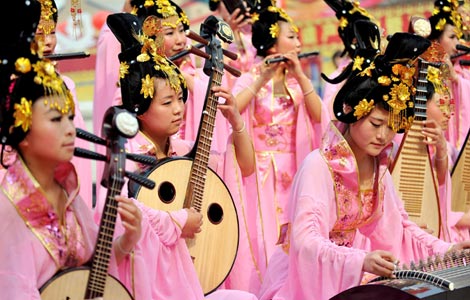 |
|
|
|
|||||||||||
Nation needs to mobilize its soft power resources to win more hearts
Kung fu, pandas or Peking Opera are what one would commonly associate with China - but they are also vital cogs in a massive "soft power" exercise that China hopes will give it more global voice and an image makeover. It is also proving to be a tough challenge for policymakers, as the growth of the country's "soft power" has not been in tandem with that of its "hard power".
So why all this brouhaha about "soft power", one may ask.
The answer can be found in the realms of the foreign strategy of China that advocates peaceful coexistence along with robust economic growth.
But with so many ingredients that make up the dish called "soft power", there are also doubts as to what should be the driving force for this collective vehicle. Policymakers believe that the real key to soft power lies in bolstering cultural productions and expanding the global cultural footprint.
Lending further credence to this view is the statement made by President Hu Jintao in the first 2012 issue of Qiushi (Seeking Truth), a bi-monthly political theory periodical published by the Central Committee of the Communist Party of China. Hu writes that cultural strength is the basis of China's soft power and competitiveness on the international stage.
The opening of the first Confucius Institute in Seoul in 2004, or the expanding presence of Chinese media companies overseas, or even the ongoing first-ever Chinese Culture Year in Germany, are all indicative of the steps taken by China to spruce up its international image and soft power.
"China should use culture as a diplomatic platform to enhance its image and project its soft power," Culture Minister Cai Wu said at a recent news conference.
Clearer picture
"There is no doubt that China has impressed the world with its booming economy. But that alone is not enough," said Yu Guoming, journalism professor at Renmin University of China.
Yu feels that Chinese decision-makers are now looking to give the world a better picture of China through the appeal of its culture. To some extent, this also explains the buzz of activity associated with the culture sector, he said.
"Culture is fast emerging as the crucial indicator of China's competitiveness in the contemporary world."
With China's influence growing steadily, the thrust for the future is not only to export more goods, but also showcase the life and culture of the nation to the rest of the world.
According to information provided by the General Administration of Customs, in 2011, China's exports of cultural products hit a new high of $18.7 billion, an increase of 22.2 percent over the previous year. Industry experts believe that this robust growth momentum will grow substantially in line with the nation's plans to boost its "soft power".
"China wants to forge greater trust with the world, especially through more cultural exchanges, as it helps build the global image of a peaceful rising power," said Martyn Davies, chief executive of Frontier Advisory, a leading research and strategy firm from South Africa that specializes in the emerging markets.
Davies said that China has one of the most ancient cultures in the world, and more cultural contacts will help the country learn international communication rules, thereby reducing misunderstandings and stereotyped bias.
"The world also has a curiosity and urge to better understand China rather than just its economic strength," Davies said.
"Other countries' interests in China's politics and economy have inevitably extended to the cultural area."
European connection
Europe has been one of the vocal supporters of the Beijing strategy to boost soft power by expanding its cultural footprint.
"Economic cooperation is not and cannot be the sole dimension of the EU-China relationship. That is why people-to-people contacts have been added to EU-China strategic partnership. Cultural exchanges are at the heart of this new dimension," said European Commissioner Androulla Vassiliou.
"Both Beijing and Brussels acknowledge the significant role of culture in international relations."
Vassiliou said movies, books, music and other cultural products, as well as their creators and performers, play an important role in the way nations perceive themselves and each other in today's interconnected world.
"I am convinced that Europeans and Chinese still know too little about each other," Vassiliou said.
For the cultural expansion strategy, China has chosen the legendary Chinese philosopher Confucius as its brand ambassador. The Beijing-based non-profit Confucius Institutes have emerged as China's most successful global brand for promoting Chinese language and culture.
By the end of last year, there were about 358 Confucius Institutes and 500 Confucius classrooms in five continents, covering 105 countries and regions, with registered students more than 50 million.
Xu Lin, director of the Confucius Institute Headquarters, said China's remarkable change has been the catalyst for the sudden global resurgence in Chinese culture and language.
She said that at a time when most of the Western economies are reeling from financial problems, the Chinese growth engine has chugged along relatively smoothly, thereby sparking the curiosity to understand more about China and the Chinese way of thinking.
Better understanding
"Foreigners are puzzled by how much China could achieve economically in just 30 years. They are now more than keen to learn Chinese language and culture to get fresh perspectives and know more of the country," Xu said, adding that it has also been the motivator for many nations to set up Confucius Institutes.
"In addition to obtaining language skills, people are also surprised to find that by using Eastern wisdom, many contradictions and conflicts can be solved as Chinese tradition always advocates harmony," Xu said.
"Students taking classes at the Confucius Institutes feel that learning Chinese also increases their future employment opportunities," said Michael Kahn-Ackermann, senior adviser to the Confucius Institute.
But more importantly, the Chinese language and culture training opportunities will help deepen intercultural understanding and thus soften China's image as a threat as it grows stronger both economically and politically.
Confucius Institutes have helped trained more people in Chinese, which experts believe is also conducive to the expansion of other Chinese culture, particularly literature.
Word power
"Good translators are vital to take Chinese literary works to overseas markets," said Ya Ding, a famous Chinese author, who is also the president of the Association for the Development of China-France Exchanges.
In 1985, Ya was awarded the young translator prize by the French government for his Chinese translation of French philosopher Jean-Paul Sartre's The Age of Reason.
Ya knows well that literature is in fact the art of language. Over the past 27 years, Ya has been dedicated to literary creations in French. So far, he has completed seven French written books, all about China.
His first such book entitled Le Sorgho rouge sold 500,000 copies soon after it was published, and became a best seller in France in 1987, and also won eight literary awards there.
"People in Europe are keen on literature from China, but because of the lack of dissemination channels as well as the shortage of proficient translators, many of the best-selling books from China are relatively unknown in Europe," Ya said.
To reverse the situation, both Chinese writers and publishers are looking to boost the global impact of Chinese literature as more language experts emerge.
"The United States runs trade deficits in Sino-US merchandise trade, but in cultural products, China's deficit is even bigger. However, the situation is fast improving," said literary critic Zhang Qinghua, who is also head of the International Communication Center of Chinese Contemporary Literature at Beijing Normal University.
He said China's best-selling books and works of well-known writers are becoming increasingly appealing to international publishers, because overseas readers would like to see more "stories" reflecting contemporary China.
Statistics from the General Administration of Press and Publication shows China's imports to exports ratio of publication copyrights trade has slipped from 7.2:1 in 2005 to 3:1 in 2010.
It also shows that to date more than 1,000 Chinese contemporary literary works have been translated into other languages since China's reform and opening-up, of which more than 90 percent are novels and fiction.
The Chinese government has also stepped up its efforts in this promotion campaign.
China's flagship literature magazine, People's Literature, launched an English version in November, marking a milestone in Chinese contemporary literature tapping into overseas audiences.
China Publishing Group, China's largest State-sponsored publishing conglomerate, exported 544 book copyrights in 2011 compared with 243 in 2006, an increase of more than 124 percent. The group has also established tie-ups with more than 60 publishing houses in 30 countries and regions.
"China should rely on publishers in developed countries who have rich international publishing experience to co-publish books about the nation to have more wide-ranging effects," Zhang said.
Literary works are more vivid to present the ecological structure of Chinese society, and to make others better understand the great social changes that have taken place isince China embarked on reform and opening up.
"The same results cannot be achieved through diplomatic channels," Zhang said.
Reaching out
Like literature, performing arts has also played an indispensable role in consolidating China's soft power.
In 2005, the Ministry of Culture issued a notice encouraging performing arts troupes to take an active part in international competitions and cooperation, as well as further promote the exports of commercial performances.
But after seven years' of efforts, the major problem for China's performing groups is reaching out to the mainstream Western audience.
While some companies are still searching for answers, some early birds have reaped the benefits.
Set up in 1991, Wu Promotion is one of China's pioneering performing arts companies and event organizers.
Every year the company organizes more than 300 concerts and events in Europe, and is one of the most successful private enterprises to take classical Chinese performance overseas.
"Europe's mainstream society does not exclude foreign culture, but we should wisely choose our products," said Wu Jiatong, manager of the company.
"A good product not only meets the audience tastes but also passes profound cultural connotations."
"For example, if you stage Peking Opera in Italy, apart from a perfect show on stage, you also need to inform the audience off stage that like Italian opera, Peking Opera is the national opera of China and also an ancient performing art," he said.
After expanding its global business operations to Europe and the Middle East, Wu Promotion is poised to enter the US market in 2014.
"It is a gradual process for China's performance products to enter mainstream Western society, and may take the efforts of several generations."
"We hope in the near future we could not only be able to see China-made clothes and shoes in New York, Paris or London, but also people lining up to buy theater tickets for Chinese performing arts."
Big disappointment
Film, one of China's most important soft power ingredients, has not seen the kind of success that policymakers envisaged nor has it made box-office waves.
While China's domestic box office revenue has climbed to new highs in the past few years, directors and producers are facing an embarrassing situation of receiving hardly any attention in Western markets.
Sergei Vladimirovich Bodrov, a two-time Academy Award-nominated Russian-US film director, uses a metaphor to say that Chinese filmmakers need to learn proper story-telling languages that are accepted by the West.
"Filmmakers are like street musicians - you have to attract passers-by in a few seconds to let them throw money to you."
But some industry insiders are optimistic that Chinese filmmakers may soon make major breakthroughs.
China Lion Film Distribution Inc, a film distributor in North America and New Zealand, has been partnering with two top film production companies in China, Huayi Bros and Bona, to screen Chinese films in major US cities since 2010.
The company chooses 12 to 15 Chinese films every year to exclusively screen them in the United States and Canada, with an average of 20 to 37 screens dedicated to these films all year long in Los Angeles, New York and San Francisco.
Joshua Lo, marketing coordinator of China Lion, said the current audiences are mainly overseas Chinese, "but if the film is unique such as historical topics, local Western audiences would show interest, too".
Since 2010 when the screenings began, the influence of Chinese films has been growing, Lo said, and he estimated that in three to five years, Chinese films will make major breakthroughs in overseas markets.
"Some avant-garde film directors like Jia Zhangke have already established themselves at international film festivals. So we just need to keep trying."
Some film insiders point out that the importance of developing China's film industry is not just to earn bigger box office receipts.
"The biggest meaning of Hollywood films is that every year, thousands of millions of people around the world watch them, through which they learn about American values, culture and way of life," said Zhou Tiedong, president of China Film Promotion International.
However, as more Chinese cultural products make inroads in the overseas markets, there should also be awareness that such kind of products need a longer time for success.
Contract the writers through liulu@chinadaily.com.cn

|

|

|

|

|

|